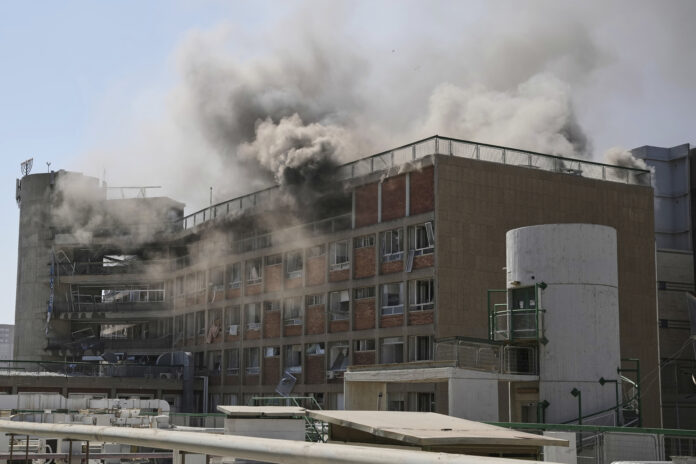- Iran launched around 20 ballistic missiles at Israel, with one directly hitting Soroka Medical Center in Beersheba, injuring civilians and sparking outrage.
- Israel responded by targeting the area near Iran’s Arak nuclear facility, warning civilians to evacuate and escalating the threat of deeper conflict.
- Global tension grows as the U.S. weighs involvement, while Iran’s Supreme Leader warns of severe consequences for any American military action.
The conflict between Iran and Israel erupted into new levels of violence early Thursday morning when Iran launched a powerful barrage of roughly 20 ballistic missiles toward Israeli territory. Among the targets hit was a major hospital in southern Israel, leaving the country reeling on the seventh day of mounting chaos.
The attack, which officials in Jerusalem believe was a direct response to recent Israeli strikes on Iran’s nuclear infrastructure, marks one of the most dangerous escalations in the region in recent years.
Hospital in Beersheba Takes a Direct Hit
As the sun was just beginning to rise, a missile slammed into Soroka Medical Center in Beersheba, one of Israel’s largest and most critical hospitals. The impact caused significant damage, sparking fear and outrage across the country.
Patients, doctors, and hospital staff scrambled to find shelter as emergency sirens wailed. Eyewitnesses described scenes of panic and destruction, with shattered glass and debris littering hallways. Although Israeli officials have not yet released full casualty details, early reports suggest that at least a dozen people were injured, some critically.
“This was a deliberate attack on a place of healing,” one senior health official said. “It’s not just an attack on infrastructure. It’s an attack on humanity.”
Across social media, images and videos of the damaged hospital quickly went viral. In Israel, public reaction has been one of fury. Hashtags like #HandsOffHospitals and #DefendIsrael began trending within hours, and protests demanding a forceful response erupted in cities from Tel Aviv to Haifa.
Israeli Military Sends Its Own Warning
In a swift countermeasure, the Israeli Defense Forces (IDF) issued a chilling warning to Iranian officials and civilians. Their message: evacuate immediately from the region surrounding Iran’s Arak heavy water reactor.
The IDF shared a satellite image of the nuclear site on its official X (formerly Twitter) account, marking the location with a bold red circle. It was a clear signal: Israel is prepared to hit Iran’s nuclear capabilities if provoked again.
Hours later, Iranian state media confirmed that the Arak site had been struck. According to the broadcast, however, there was no risk of radioactive contamination. Officials insisted the area had been cleared prior to the strike.
Still, the symbolism was impossible to ignore. Israel had just shown it could hit deep into Iran — and Iran had already proven it was willing to hit back, even at civilian sites.
Global Tensions Rise as U.S. Watches Closely
As the Middle East inches closer to full-scale war, global powers are treading cautiously. While rumors have circulated that the United States may offer military backing to Israel, President Donald Trump has not yet committed.
Speaking to reporters late Wednesday, Trump said he was “monitoring the situation closely” and consulting with military advisors. Sources inside the Pentagon suggest the administration is evaluating various forms of support, including tactical assistance for a potential Israeli strike on Iranian nuclear sites.
Still, the prospect of American boots on the ground—or even U.S. airpower entering the fray—has alarmed many at home and abroad. War-weary citizens have flooded news comment sections and social platforms urging restraint, with one X user writing, “We don’t want another endless war in the Middle East. Help Israel with diplomacy, not bombs.”
But others, especially in conservative circles, argue that a strong American stance is necessary to deter Iran’s aggression. “If we don’t stop Iran now, when will we?” a former State Department official posted. “They’ve crossed every red line.”
Ayatollah’s Threat Raises the Stakes
Iran’s Supreme Leader, Ayatollah Ali Khamenei, didn’t mince words. In a fiery address broadcast across the nation on Wednesday, he warned that any American military involvement would come at a steep cost.
“Let the United States know this clearly,” Khamenei said. “Any act of war against Iran will cause irreparable damage to them. We are not Iraq, we are not Afghanistan. We will defend ourselves with all we have.”
The statement was clearly designed not just for American ears, but also for the Iranian people — a rallying cry meant to unify the nation under a banner of resistance.
However, beneath the surface, not all Iranians appear to support the direction their leaders are taking. Quietly, some citizens have expressed worry that the government’s retaliation could backfire. “We’re tired of war,” said a Tehran resident, who asked to remain anonymous. “This path only brings destruction.”
What Comes Next?
As the dust settles from Thursday morning’s attack, the world is left bracing for the next move. The direct strike on Soroka Medical Center represents a grim turning point. Hospitals, typically off-limits even in war, have now become targets.
Both nations remain on high alert. Israel is reportedly repositioning anti-missile batteries, reinforcing air defenses, and preparing for potential strikes on additional Iranian nuclear facilities. Iran, for its part, has vowed “further action” if Israel continues to violate its sovereignty.
Diplomatic efforts are ongoing behind the scenes, with European leaders pushing for de-escalation. But so far, neither side seems willing to step back.
In the streets of Jerusalem, many citizens say the time for diplomacy has passed. “We’ve been patient,” one protester shouted at a rally outside the Knesset. “But when our hospitals are bombed, we can’t sit still. It’s time to hit back hard.”
Whether the world will see another large-scale war unfold in the heart of the Middle East may depend on what happens in the next 48 hours. One miscalculation — one wrong missile — could be all it takes.
And for those inside Soroka Medical Center, already rebuilding from the damage, that next attack feels all too real.




